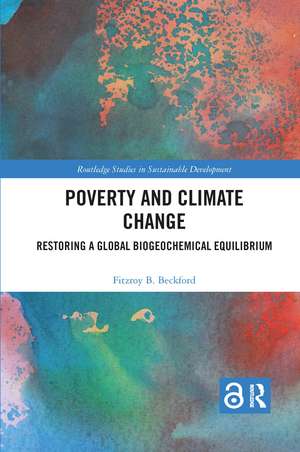Poverty and Climate Change: Restoring a Global Biogeochemical Equilibrium: Routledge Studies in Sustainable Development
Autor Fitzroy B. Beckforden Limba Engleză Paperback – 4 mar 2020
Ever since Europeans made contact with the West, a series of global circumstances including the genocide of the indigenous people of the Americas, the enslavement and global subjugation of Africans, and the emergence of Western concepts of trade dominance and capitalism, have led to deleterious impacts on the global biogeochemical cycles. Addressing the broken biogeochemical cycles should be done with a clear understanding that it was not only human subjects which were subjugated, but also land, water, and air. These three global stores must be replenished from the ideological position that poverty is not simply the absence of money, but is also the lack of access to non-polluting energy sources, to clean air devoid of runaway greenhouse gasses, and to local conditions devoid of climate change instabilities. With this in mind, the global powerbrokers can enter into a new deal with developing nations, shifting the paradigm toward a new ecological approach that rewards good behavior and sets new standards of worldwide relations based on ecologic inclusivity rather than the exclusive economic arrangements currently in order.
Harnessing a forward thinking approach to analyzing the current global environmental crisis, this book will be of great interest to students and scholars of sustainable development, political ecology, sustainable agriculture, climate change and environmental justice.
Din seria Routledge Studies in Sustainable Development
-
 Preț: 311.29 lei
Preț: 311.29 lei -
 Preț: 322.34 lei
Preț: 322.34 lei -
 Preț: 304.74 lei
Preț: 304.74 lei -
 Preț: 304.66 lei
Preț: 304.66 lei -
 Preț: 416.22 lei
Preț: 416.22 lei - 14%
 Preț: 300.46 lei
Preț: 300.46 lei -
 Preț: 371.68 lei
Preț: 371.68 lei -
 Preț: 333.14 lei
Preț: 333.14 lei - 16%
 Preț: 244.38 lei
Preț: 244.38 lei -
 Preț: 446.32 lei
Preț: 446.32 lei -
 Preț: 413.55 lei
Preț: 413.55 lei -
 Preț: 490.46 lei
Preț: 490.46 lei - 16%
 Preț: 273.65 lei
Preț: 273.65 lei -
 Preț: 487.37 lei
Preț: 487.37 lei -
 Preț: 369.77 lei
Preț: 369.77 lei -
 Preț: 392.24 lei
Preț: 392.24 lei - 12%
 Preț: 299.52 lei
Preț: 299.52 lei - 18%
 Preț: 997.93 lei
Preț: 997.93 lei - 18%
 Preț: 997.90 lei
Preț: 997.90 lei -
 Preț: 411.42 lei
Preț: 411.42 lei -
 Preț: 449.41 lei
Preț: 449.41 lei -
 Preț: 487.37 lei
Preț: 487.37 lei -
 Preț: 449.41 lei
Preț: 449.41 lei -
 Preț: 389.66 lei
Preț: 389.66 lei -
 Preț: 416.22 lei
Preț: 416.22 lei -
 Preț: 416.22 lei
Preț: 416.22 lei -
 Preț: 389.49 lei
Preț: 389.49 lei -
 Preț: 326.03 lei
Preț: 326.03 lei - 18%
 Preț: 1055.51 lei
Preț: 1055.51 lei - 18%
 Preț: 1000.27 lei
Preț: 1000.27 lei -
 Preț: 479.96 lei
Preț: 479.96 lei
Preț: 270.41 lei
Preț vechi: 325.41 lei
-17% Nou
Puncte Express: 406
Preț estimativ în valută:
51.74€ • 54.17$ • 42.81£
51.74€ • 54.17$ • 42.81£
Carte tipărită la comandă
Livrare economică 07-21 aprilie
Preluare comenzi: 021 569.72.76
Specificații
ISBN-13: 9780367500580
ISBN-10: 0367500582
Pagini: 188
Ilustrații: 12
Dimensiuni: 156 x 234 x 21 mm
Greutate: 0.35 kg
Ediția:1
Editura: Taylor & Francis
Colecția Routledge
Seria Routledge Studies in Sustainable Development
Locul publicării:Oxford, United Kingdom
ISBN-10: 0367500582
Pagini: 188
Ilustrații: 12
Dimensiuni: 156 x 234 x 21 mm
Greutate: 0.35 kg
Ediția:1
Editura: Taylor & Francis
Colecția Routledge
Seria Routledge Studies in Sustainable Development
Locul publicării:Oxford, United Kingdom
Public țintă
PostgraduateCuprins
Part I: How global environmental democracy died
1. The American native and the European invader – the nexus
2. Facets and consequences of environmental slavery
3. It’s the ecology, stupid
4. The Biogeochemical Cycles in the Era of Anthropogenic Climate Change
5. A Review of the Biogeochemical Cycling of the Elements of Life
6. Addressing the Biogeochemical cycles with Transformative Anthropocentrism
Part II: Applying Practical Solutions; Reconnecting Earth and Sky
7. Feeding the future: Farming in a post-carbon economy
8. Transitioning to low-carbon farming: An assessment of the process
9. The kinetic role of biochar in Climate Change mitigation
10. Biochar in the age of renewable energy policy
11. How alleviating energy-poverty will also improve the climate
12. Envisioning a transformative age
1. The American native and the European invader – the nexus
2. Facets and consequences of environmental slavery
3. It’s the ecology, stupid
4. The Biogeochemical Cycles in the Era of Anthropogenic Climate Change
5. A Review of the Biogeochemical Cycling of the Elements of Life
6. Addressing the Biogeochemical cycles with Transformative Anthropocentrism
Part II: Applying Practical Solutions; Reconnecting Earth and Sky
7. Feeding the future: Farming in a post-carbon economy
8. Transitioning to low-carbon farming: An assessment of the process
9. The kinetic role of biochar in Climate Change mitigation
10. Biochar in the age of renewable energy policy
11. How alleviating energy-poverty will also improve the climate
12. Envisioning a transformative age
Notă biografică
Fitzroy B. Beckford is an agricultural scientist who holds a PhD in Sustainability Education with a research emphasis on integrated food-energy systems (IFES). Integral areas of his work include concepts in nutrient biogeochemical cycling and restorative anthropedogenesis.
Descriere
Ever since Europeans made contact with the west, a series of global circumstances have led to serious impacts on the global biogeochemical cycles. Addressing the broken biogeochemical cycles should be done with a clear understanding that it was not only humans who were subjugated, but also land, water, and air.
